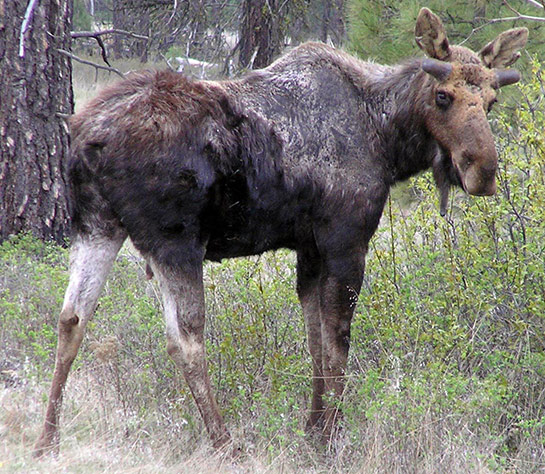New Hampshire’s moose population has suffered a significant decline in recent years. To understand why moose are dying, state Fish and Game officials are launching a collar tracking study this month. The state’s moose herd has decreased by about 40 percent since the 1990s, falling from roughly 7,000 moose to the current population of 4,000 animals, according to WBZ-TV. New Hampshire Fish and Game reports the population peaked in 1996 at approximately 7,600 moose.
Some blame hunting for the sharp population drop, but that explanation ignores the fact that hunting permits are down and moose are still dying at higher rates than normal. Fish and Game started reducing permit numbers in 2007, dropping from 675 permits to issuing just 275 for the 2012-2013 season. So instead of focusing on hunting, the new study will identify natural causes of death. Fish and Game officials will begin tagging moose in seven of the state’s northern communities on January 20.
Helicopter crews will tranquilize moose from the air, then descend to draw blood, count ticks, and collar each animal. Project leader Kristine Rines reports a single moose may carry as many as 160,000 ticks in a bad tick year. Although ticks can cause outright mortality in moose, cows with high tick counts can lose so much weight that their fertility suffers, Rines explained in an interview on the Fish and Game website.
Researchers performed a similar study from 2001 to 2006. This new study should determine if natural deaths have increased since the previous study’s conclusion. Officials will collar about 80 cows and calves during the next two years. Although the study itself will span three years, researchers will continue to monitor collared animals as long as their collars transmit a signal. They will keep tabs on how long a moose lives and, once it dies, they will track down the animal to determine what caused its death. Officials hope to pinpoint weather, ticks, or other diseases and parasites that might be responsible for the spike in moose deaths.
“If this trend is driven primarily by winter tick, then every year will be different, because weather is such a big player,” Rines said in the interview. “What we learn will help our moose management team anticipate and respond to changing moose mortality and productivity.”

